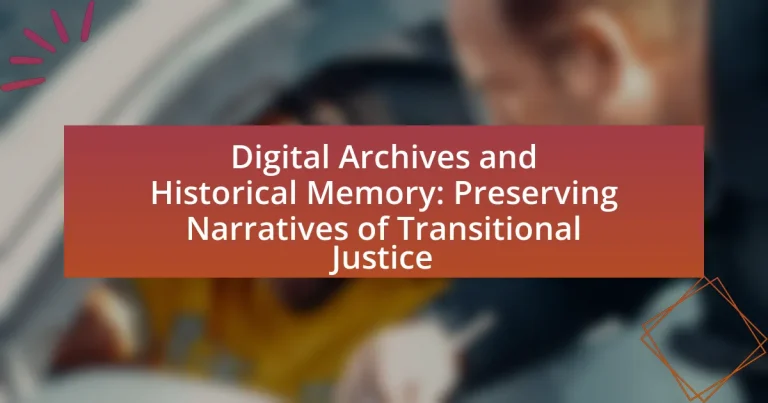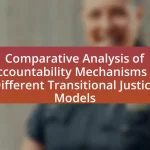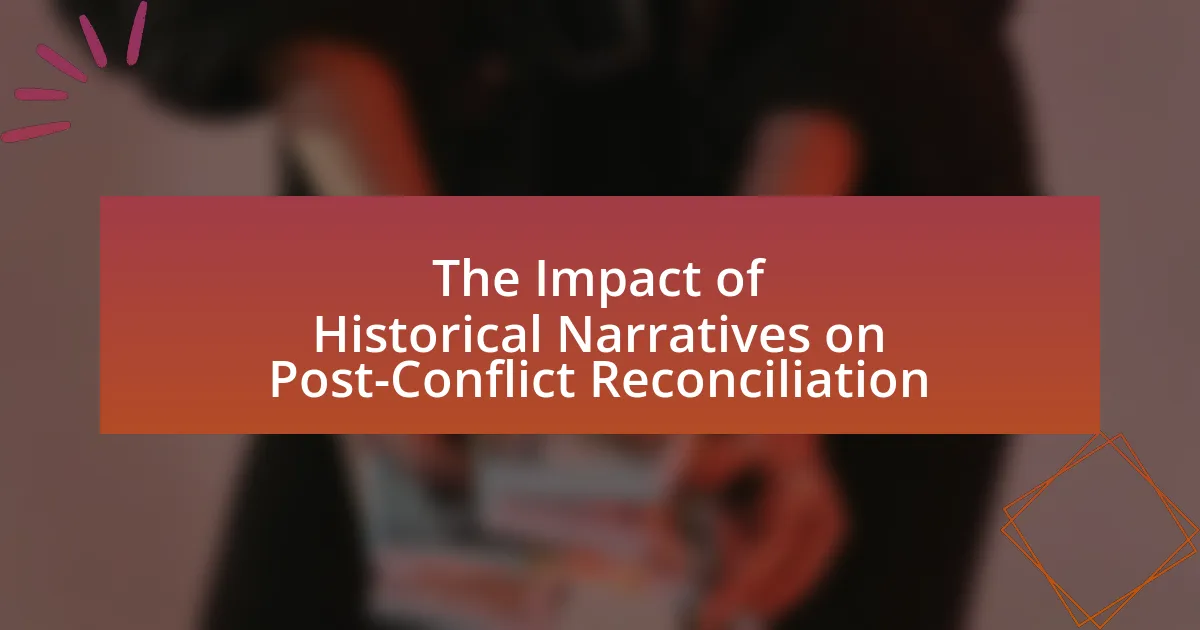Digital archives are organized collections of digital materials that play a vital role in preserving historical memory, particularly in the context of transitional justice. They facilitate the documentation and dissemination of narratives, ensuring that voices of victims of human rights abuses are accessible for future generations. The article explores how digital archives contribute to the preservation of historical narratives, enhance accessibility to documents, and support truth-telling and accountability. It also addresses the challenges faced by digital archives, including technological obsolescence and ethical considerations, while highlighting best practices for improving their effectiveness in promoting public engagement and community participation in transitional justice initiatives.
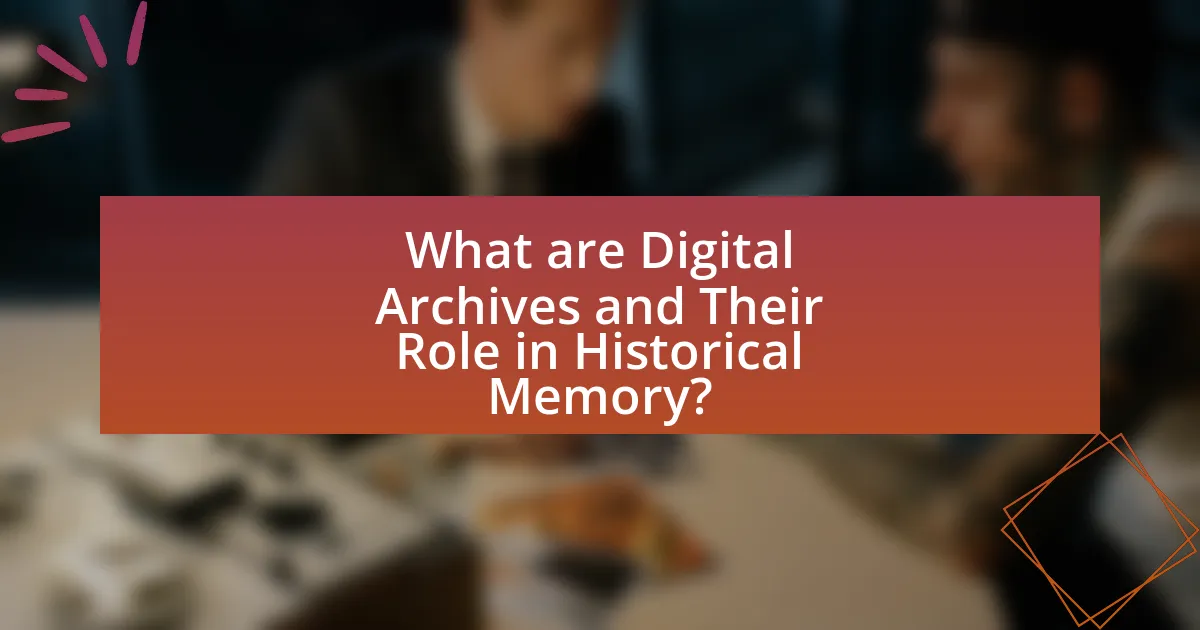
What are Digital Archives and Their Role in Historical Memory?
Digital archives are organized collections of digital materials that preserve and provide access to historical documents, images, and multimedia content. Their role in historical memory is crucial as they facilitate the documentation and dissemination of narratives, particularly in contexts of transitional justice, where societies confront past injustices. For instance, digital archives can house testimonies from victims of human rights abuses, ensuring that these voices are preserved and accessible for future generations. This preservation supports collective memory and accountability, as evidenced by projects like the South African Truth and Reconciliation Commission, which utilized digital archives to document the apartheid era. By making historical records available online, digital archives enhance public engagement with history and promote a more inclusive understanding of the past.
How do digital archives contribute to the preservation of historical narratives?
Digital archives significantly contribute to the preservation of historical narratives by providing accessible, organized, and searchable repositories of primary source materials. These archives enable researchers, educators, and the public to access documents, photographs, and audiovisual materials that capture diverse perspectives on historical events, thus enriching the understanding of transitional justice. For instance, the digital archive of the Truth and Reconciliation Commission in South Africa offers a wealth of testimonies and reports that document the experiences of victims and perpetrators, ensuring that these narratives are preserved for future generations. By digitizing and curating such materials, digital archives safeguard against the loss of historical context and promote a more inclusive representation of history.
What types of materials are typically included in digital archives?
Digital archives typically include a variety of materials such as documents, photographs, audio recordings, video footage, and datasets. These materials serve to preserve historical narratives and facilitate access to information related to transitional justice. For instance, documents may encompass legal texts, reports, and personal testimonies, while photographs and videos can capture significant events and individuals involved in transitional justice processes. Audio recordings often include interviews and oral histories that provide personal perspectives. The inclusion of diverse formats ensures a comprehensive representation of historical memory and supports research and education in the field.
How do digital archives enhance accessibility to historical documents?
Digital archives enhance accessibility to historical documents by providing online platforms where users can easily search, view, and interact with a vast array of primary sources. These digital repositories eliminate geographical barriers, allowing individuals from diverse locations to access documents that were previously confined to physical archives. For instance, the National Archives in the United States has digitized millions of documents, making them available to the public, which significantly increases the reach and usability of historical materials. Additionally, digital archives often include advanced search functionalities and metadata, enabling users to locate specific documents quickly and efficiently, thereby facilitating research and education on historical events and narratives.
Why is historical memory important in the context of transitional justice?
Historical memory is crucial in the context of transitional justice because it helps societies acknowledge past atrocities and fosters accountability. By preserving narratives of historical events, transitional justice mechanisms can ensure that victims’ experiences are recognized and validated, which is essential for healing and reconciliation. For instance, countries like South Africa utilized truth commissions to document human rights violations during apartheid, thereby creating a collective memory that informs current and future generations about the importance of justice and human rights. This process not only aids in preventing the recurrence of violence but also strengthens democratic institutions by promoting a culture of transparency and respect for human dignity.
What role does historical memory play in societal healing after conflict?
Historical memory plays a crucial role in societal healing after conflict by fostering understanding and reconciliation among affected communities. It allows societies to acknowledge past injustices, facilitating dialogue and empathy, which are essential for rebuilding trust. For instance, post-apartheid South Africa utilized the Truth and Reconciliation Commission to document historical narratives, helping to address grievances and promote healing. This process of remembering and confronting the past is vital, as it not only honors victims but also educates future generations, preventing the recurrence of violence.
How can historical memory influence future justice initiatives?
Historical memory can significantly influence future justice initiatives by shaping public perception and informing policy decisions. When societies acknowledge and preserve their historical narratives, particularly those related to past injustices, they create a foundation for accountability and reconciliation. For instance, countries like South Africa utilized the Truth and Reconciliation Commission to address apartheid’s legacy, demonstrating how historical memory can guide restorative justice efforts. Furthermore, digital archives play a crucial role in this process by providing accessible records of past events, allowing future generations to learn from history and advocate for justice. This connection between historical memory and justice initiatives is evident in various transitional justice frameworks, which emphasize the importance of remembering past atrocities to prevent their recurrence.
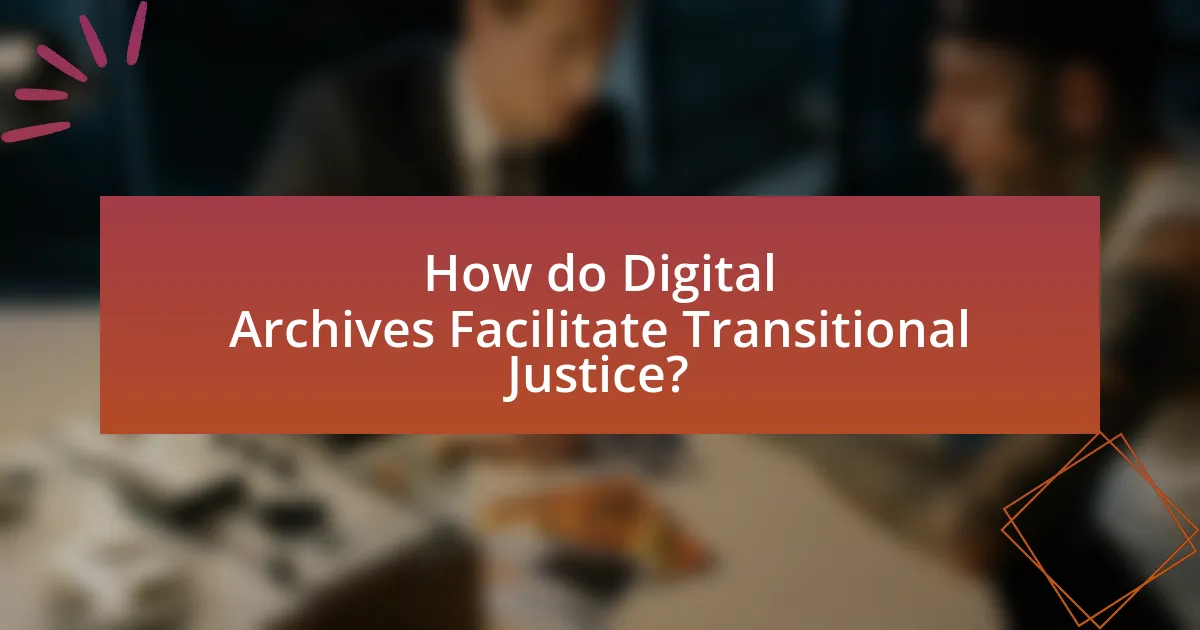
How do Digital Archives Facilitate Transitional Justice?
Digital archives facilitate transitional justice by providing accessible platforms for documenting and preserving historical narratives related to human rights violations. These archives enable victims and communities to share their experiences, fostering public awareness and accountability. For instance, the Truth and Reconciliation Commission in South Africa utilized digital archives to store testimonies, which helped in acknowledging past atrocities and promoting healing. Furthermore, digital archives enhance research capabilities, allowing scholars and activists to analyze patterns of injustice and advocate for policy changes based on documented evidence. This accessibility and preservation of information are crucial for ensuring that the memories of affected individuals and communities are not forgotten, thereby supporting the broader goals of transitional justice.
What specific functions do digital archives serve in transitional justice processes?
Digital archives serve critical functions in transitional justice processes by preserving evidence, facilitating access to information, and promoting accountability. These archives document human rights violations and historical narratives, ensuring that victims’ experiences are recorded and accessible for future generations. For instance, the Truth and Reconciliation Commission in South Africa utilized digital archives to store testimonies and documents, which helped in acknowledging past atrocities and fostering national healing. Additionally, digital archives enhance public awareness and education about transitional justice issues, contributing to societal understanding and reconciliation efforts.
How do digital archives support truth-telling and accountability?
Digital archives support truth-telling and accountability by providing accessible, verifiable records of historical events and testimonies. These archives preserve documents, multimedia, and personal narratives that can be used to corroborate facts and challenge misinformation. For instance, the Truth and Reconciliation Commission in South Africa utilized digital archives to document human rights abuses during apartheid, allowing victims to share their stories and hold perpetrators accountable. This process not only aids in the healing of communities but also establishes a factual basis for historical narratives, ensuring that the truth is recognized and acknowledged.
What impact do digital archives have on victims’ narratives?
Digital archives significantly enhance victims’ narratives by providing a platform for preservation, accessibility, and dissemination of their stories. These archives allow victims to document their experiences in a structured manner, ensuring that their voices are recorded and can be referenced in historical contexts. For instance, the use of digital archives in transitional justice initiatives has been shown to facilitate the recognition of victims’ experiences, as evidenced by projects like the South African Truth and Reconciliation Commission, which utilized digital platforms to archive testimonies. This accessibility not only empowers victims by validating their experiences but also fosters public awareness and education regarding historical injustices, thereby contributing to collective memory and societal healing.
How can digital archives promote public engagement with transitional justice?
Digital archives can promote public engagement with transitional justice by providing accessible platforms for sharing historical narratives and testimonies related to past injustices. These archives facilitate the dissemination of information, allowing individuals and communities to explore and understand the complexities of transitional justice processes. For instance, the Truth and Reconciliation Commission of South Africa utilized digital archives to make testimonies available online, enabling broader public access and fostering dialogue about the nation’s apartheid history. This accessibility encourages participation in discussions about justice, accountability, and healing, thereby enhancing civic engagement and awareness of transitional justice issues.
What strategies can be employed to encourage community participation in digital archives?
To encourage community participation in digital archives, strategies such as outreach programs, collaborative projects, and user-friendly platforms can be employed. Outreach programs, including workshops and community events, raise awareness and educate the public about the importance of digital archives, fostering a sense of ownership and involvement. Collaborative projects, where community members contribute content or narratives, enhance engagement and ensure diverse perspectives are represented. User-friendly platforms that facilitate easy access and interaction with the archives encourage participation by making the experience accessible and enjoyable. Research indicates that community-driven initiatives significantly increase participation rates, as seen in the case of the Digital Public Library of America, which reported a 40% increase in user contributions following targeted outreach efforts.
How do digital archives foster dialogue among diverse stakeholders?
Digital archives foster dialogue among diverse stakeholders by providing accessible platforms for sharing and preserving historical narratives. These archives enable various groups, including researchers, community members, and policymakers, to engage with primary sources and documents that reflect multiple perspectives on transitional justice. For instance, the use of digital archives in post-conflict societies allows stakeholders to collaboratively explore and discuss differing viewpoints on historical events, thereby promoting understanding and reconciliation. Research indicates that digital archives can enhance participatory engagement, as seen in projects like the “Digital Public Library of America,” which connects diverse communities through shared historical resources.
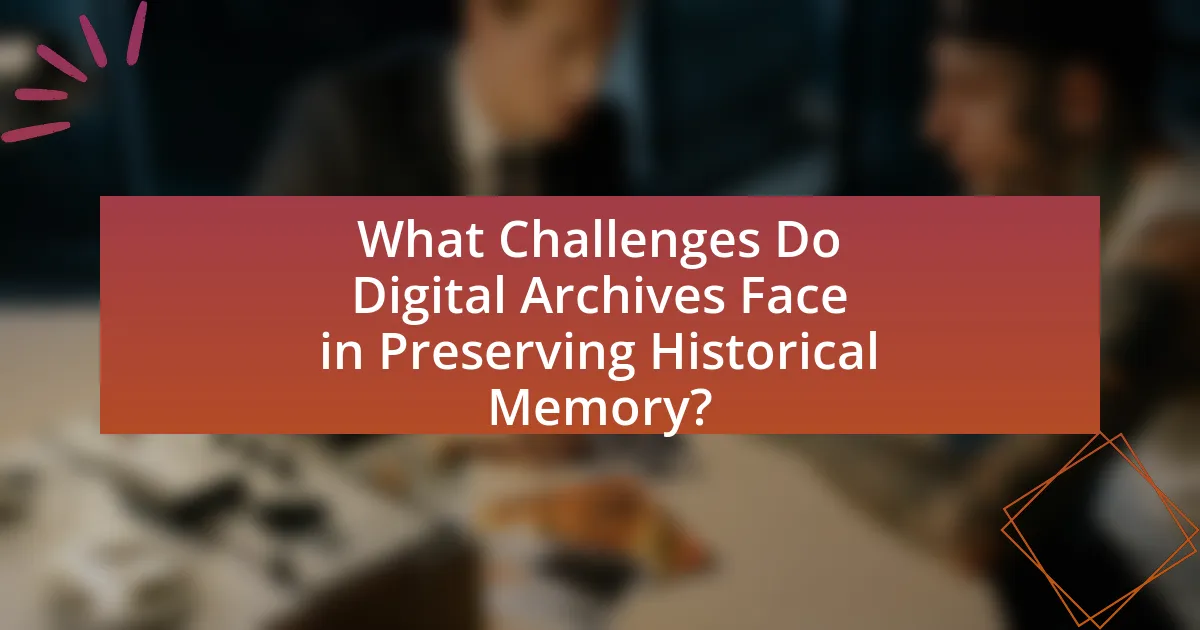
What Challenges Do Digital Archives Face in Preserving Historical Memory?
Digital archives face significant challenges in preserving historical memory, primarily due to issues of technological obsolescence, data integrity, and accessibility. Technological obsolescence occurs as software and hardware evolve, risking the loss of access to archived materials if they are not migrated to current formats. Data integrity is compromised by risks such as corruption, unauthorized alterations, or loss of context, which can distort historical narratives. Accessibility challenges arise from disparities in digital literacy and resource availability, limiting the ability of diverse populations to engage with these archives. These challenges highlight the need for ongoing investment in preservation strategies and inclusive access initiatives to ensure that historical memory remains intact and available for future generations.
What are the technical challenges associated with maintaining digital archives?
The technical challenges associated with maintaining digital archives include data degradation, format obsolescence, and security vulnerabilities. Data degradation occurs as storage media deteriorate over time, risking loss of information. Format obsolescence arises when file formats become outdated, making it difficult to access or interpret archived data; for instance, proprietary formats may no longer be supported by current software. Security vulnerabilities pose risks of unauthorized access or data breaches, which can compromise the integrity of sensitive historical records. These challenges necessitate ongoing investment in technology and strategies to ensure the long-term preservation and accessibility of digital archives.
How can issues of digital obsolescence affect the longevity of archives?
Digital obsolescence can significantly reduce the longevity of archives by rendering stored digital materials inaccessible due to outdated formats or technologies. As software and hardware evolve, older digital files may become unreadable, leading to potential loss of valuable historical data. For instance, a study by the Library of Congress highlights that many digital formats, such as certain versions of Microsoft Word or proprietary software, may no longer be supported after a few years, risking the preservation of documents created in those formats. This issue underscores the necessity for continuous migration and updating of digital archives to ensure their accessibility over time.
What measures can be taken to ensure the security of digital archives?
To ensure the security of digital archives, implementing robust encryption methods is essential. Encryption protects sensitive data by converting it into a format that is unreadable without the appropriate decryption key, thereby safeguarding against unauthorized access. Additionally, regular backups should be conducted to prevent data loss due to hardware failures or cyberattacks, ensuring that archives can be restored to a previous state if necessary. Access controls must be established to limit who can view or modify the archives, which can include user authentication protocols and role-based access permissions. Furthermore, conducting regular security audits helps identify vulnerabilities within the system, allowing for timely updates and patches to be applied. These measures collectively enhance the integrity and confidentiality of digital archives, which is crucial for preserving narratives of transitional justice.
What ethical considerations arise in the creation and use of digital archives?
Ethical considerations in the creation and use of digital archives include issues of consent, privacy, and representation. Consent is crucial, as individuals whose information is archived must be informed and agree to the use of their data, particularly in sensitive contexts like transitional justice. Privacy concerns arise when personal or sensitive information is digitized, potentially exposing individuals to harm or re-traumatization. Representation is also significant; archives must strive to accurately reflect diverse narratives and avoid perpetuating biases or omissions that can distort historical memory. These considerations are essential to ensure that digital archives serve their purpose ethically and responsibly, fostering trust and integrity in the preservation of historical narratives.
How can archivists balance privacy concerns with the need for transparency?
Archivists can balance privacy concerns with the need for transparency by implementing strict access controls and anonymization techniques. Access controls ensure that sensitive information is only available to authorized individuals, while anonymization techniques protect personal data by removing identifiable information. For instance, the General Data Protection Regulation (GDPR) emphasizes the importance of data protection, which archivists must adhere to while also fulfilling public interest obligations. By applying these methods, archivists can maintain the integrity of historical records while respecting individual privacy rights, thus achieving a balance between transparency and confidentiality.
What responsibilities do digital archivists have towards marginalized communities?
Digital archivists have the responsibility to ensure equitable representation and access to historical narratives for marginalized communities. This includes actively seeking out and preserving the voices, experiences, and materials that reflect the histories of these groups, which have often been overlooked or misrepresented in traditional archives. For instance, the Society of American Archivists emphasizes the importance of inclusive practices that prioritize the documentation of diverse perspectives, thereby fostering a more comprehensive historical record. Additionally, digital archivists must engage with these communities to understand their needs and perspectives, ensuring that the archival processes are participatory and respectful. This approach not only aids in the preservation of cultural heritage but also supports social justice by empowering marginalized voices in the historical narrative.
What best practices can enhance the effectiveness of digital archives in transitional justice?
Best practices that can enhance the effectiveness of digital archives in transitional justice include ensuring accessibility, implementing robust metadata standards, and fostering community engagement. Accessibility allows diverse populations to interact with the archives, which is crucial for inclusive historical narratives. Robust metadata standards facilitate efficient search and retrieval of information, ensuring that users can find relevant documents quickly. Community engagement, through participatory archiving and collaboration with local stakeholders, enriches the content and relevance of the archives, as seen in projects like the South African Truth and Reconciliation Commission, which actively involved communities in documenting their experiences. These practices collectively contribute to a more effective and meaningful digital archive in the context of transitional justice.
How can collaboration between institutions improve digital archive initiatives?
Collaboration between institutions can significantly enhance digital archive initiatives by pooling resources, expertise, and diverse perspectives. When institutions work together, they can share technological infrastructure, which reduces costs and increases efficiency in digitization processes. For example, the collaboration between the Library of Congress and the National Archives in the United States has led to the creation of comprehensive digital collections that are more accessible to the public. Additionally, joint efforts can lead to the development of standardized metadata practices, ensuring that digital archives are interoperable and easier to navigate. This is evidenced by the Digital Public Library of America, which aggregates content from various institutions, allowing for a richer and more cohesive user experience. Such partnerships not only enhance the quality and reach of digital archives but also foster a collaborative culture that prioritizes the preservation of historical narratives, particularly in the context of transitional justice.
What role does user feedback play in the development of digital archives?
User feedback plays a crucial role in the development of digital archives by informing content curation, enhancing user experience, and guiding technological improvements. Specifically, user feedback helps archivists understand the needs and preferences of their audience, leading to more relevant and accessible collections. For instance, studies have shown that incorporating user suggestions can increase engagement and satisfaction, as seen in projects like the Digital Public Library of America, which actively solicits input to refine its offerings. This iterative process ensures that digital archives remain dynamic and responsive to the evolving context of historical memory and transitional justice narratives.
